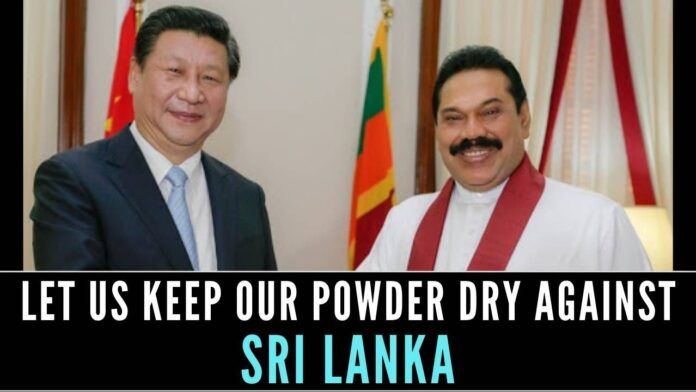
The famous philosopher Plato once said that ‘heaviest penalty for declining to rule is to be ruled by someone inferior’ potent meaning of this line is that if any country decides not to assert its power in the visceral world then a nation inferior in prowess could harm mightier one. This is exactly happening in India and Sri Lanka relations as the Indian foreign policy always remained soft and appeasing towards its small neighbors. The spook of ‘Gujral Doctrine’ named after career diplomat and former prime minister of India, Mr Indrakumar Gujral, is still haunting Indian foreign policy formulation barring Pakistan and China. It is necessary to list down the outdated principles of ‘Gujral doctrine[1]’:
-
- With neighbors like Bangladesh, Bhutan, Maldives, Nepal and Sri Lanka, India do not ask for reciprocity, but gives and accommodates what it can in good faith and trust;
- No South Asian country should allow its territory to be used against the interest of another country of the region;
- No country should interfere in the internal affairs of another;
- All South Asian countries must respect each other‘s territorial integrity and sovereignty;
- They should settle all their disputes through peaceful bilateral negotiations.
Mr Gujral proposed his own Panchasheel policy by making partial additions in already existing Panchasheel principles and he, like Mr Jawaharlal Nehru was a Micawber, nursing dreams of reciprocal affiance from neighbors despite their proven perfidy towards India.
The first postulate of ‘Gujaral Doctrine’ expects India to follow ‘Karmayog’ towards her tiny neighbors which is dangerous in the selfish world where every nation is following a policy of Procrustean bed. The second postulate is equally dangerous as it is learnt to be followed by India without any quid pro quo. The third modality is always used by neighbor countries when India warns them not to allow any anti-Indian activity on their soil or in their territorial waters and Sri Lanka is also not an exception to this. In the last few years, Sri Lankan foreign Policy is deceptive towards India. It is cleverly exploiting a ‘Satvik’ genesis of India, which is evident from its unfriendly decisions.
Recently, the Sri Lankan parliament has passed a bill to sell ‘Hambantota Port’ to China, which is merely 100 miles away from India[2]. The earlier same port was given to China on a 99-year lease which created the brouhaha in India and to counter China, India decided to develop Mattala Rajpakshe international airport being at close quarters from ‘Hambantota Port’. The Sri Lankan government started negotiations with India about Mattala Rajpakshe airport since 2018 and after showing carrot of joint venture (JV) development of airport craftily ruled out any JV with India by declaring that Sri Lanka herself is going to develop the Mattala airport[3]. The curious question is how Sri Lanka which has no wherewithal to develop the airport suddenly announced her intention to go alone in the development of the airport and the obvious answer is ‘China’ which must have employed carrot and stick diplomacy against indebted Sri Lanka to cancel any possibility of a deal with India with respect to the airport.
Another jolt coming to pass is that of acquisition of oil tank farm in the eastern city of Trincomalee by Sri Lankan government which were leased out to Indian oil corporation subsidiary for the period of 35 years for the up-gradation and commissioning of 99 tanks in it in the year 2003. The harbour in Trincomalee is considered one of the finest deep-sea, natural harbours, in a strategically coveted spot, on Sri Lanka’s north-eastern coast. India would lose a strategic location after distancing from the project paving a way for more and more Chinese intrusion in Sri Lanka.
India is perceived as a potential superpower in the world but is that possible without a firm grip on our neighbors? The straight answer is ‘no’. Our foreign policy should be ready to go to the extent of ruthlessness in case any outsider like China or the US attempts to intervene in our surrounding. Any country which has allowed to offshoot rivalry in her neighborhoods had bitten the dust, take an example of U.K; thus the USA has remorselessly followed a policy to subjugate their neighbors, any intervention within her peripheral region is considered as aggression against the USA and they was ready to fight even a nuclear war with the then USSR when ‘bay of pigs’ incident happened similarly, China has also shown very cautious approach while dealing with her neighbor countries and resists efforts of any other country to get a foothold in the south China sea region. Competing with China or the USA is meaningful when India would be able to dictate the terms of her neighbor countries. Generosity beyond a certain limit will invite further complications and the situation may spiral out of hand therefore it is time to give decent burial to ‘Gujral Doctrine’ and play aggressive foreign policy in the entire SAARC and Indian ocean region.
References:
[1] The Gujral Doctrine and Beyond – IDSA India
[2] Hambantota Port: How Chinese acquired port from Sri Lanka to ‘keep an eye’ on India – Jun 27, 2018, Financial Express
[3] Sri Lanka, not India, will develop Mattala airport: Gotabaya Rajapaksa – Dec 19, 2019, The Hindu
- Is hijab really essential in Islam? - March 4, 2022
- Liberation of Bangladesh and vote bank politics - December 2, 2021
- Let us keep our powder dry against Sri Lanka - June 15, 2021










